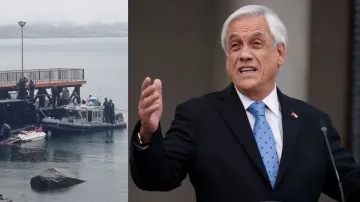Sebastian Pineram, former Chilean President, who probably was piloting helicopter of its own, dies in crash
The helicopter carrying Pinera, 74, and three others plunged into a lake in southern Chile. The former president was pronounced dead shortly after rescue personnel arrived at the scene. The other three passengers survived.

SANTIAGO: Sebastian Pinera, the two-time former president of Chile who faced social upheaval followed by a pandemic in his second term, died Tuesday in a helicopter accident. He was 74. Chile Interior Minister Carolina Tohá confirmed the death of the former president. The helicopter carrying Pinera, 74, and three others plunged into a lake in southern Chile. The former president was pronounced dead shortly after rescue personnel arrived at the scene. The other three passengers survived.
Two sources told Reuters Pinera was the pilot, although officials have not confirmed that, nor the helicopter's intended destination. Pinera often spent the Southern Hemisphere summers near the picturesque lakes that dot Chile's south, and frequently piloted his own helicopter. President Gabriel Boric declared three days of national mourning, while preparations have begun for a state funeral on Friday for the former leader, who served two non-consecutive terms between 2010 and 2022.
VIDEO: Police retrieve body from lake where Chile's ex-President Pinera died
Interior Minister Carolina Toha said the ex-president's body had been recovered from the lake, near the town of Lago Ranco. "We remember him for the way he dedicated his life to public service," said Toha, who has been helping to lead efforts to battle deadly wildfires in recent days.
Who was Sebastian Pinera
Serving as president from 2010 to 2014 and again from 2018 to 2022, he led the South American nation during devastating natural disasters, including the fallout of an earthquake and a tsunami. Pinera was perhaps best known abroad for his role overseeing the spectacular rescue in 2010 of 33 miners who were trapped underneath the Atacama desert. The event became a global media sensation and was the subject of a 2014 movie, "The 33." He also governed during the coronavirus pandemic and placed Chile among the top five countries for vaccination rates for the illness.
His legacy is marred by violent police repression in October 2019 against protesters who were demonstrating against the country's education, health and pension systems. In Chile, he was known as a successful businessman whose first term was boosted by rapid economic growth but who was often seen as out-of-touch with the country's fast-changing society. Both his presidencies were marred by frequent protests - of students demanding education reform in the first term, and of wider and often violent protests against inequality in his second term that ended with the government promising to draft a new constitution.
After leaving the presidency, Pinera remained active in politics, speaking out on issues like the attempt to draft a new constitution - which ultimately failed - and backing conservative politicians in the region, including Argentine President Javier Milei. Former Argentine President Mauricio Macri expressed his sadness at the news of Pinera's death. "He was a good person, committed like no one else to Chile and to the values of freedom and democracy in Latin America," he said.
Business success
The son of a prominent centrist politician, Pinera was a Harvard-trained economist who made his fortune introducing credit cards to Chile in the 1980s. He was also a major shareholder in the flagship airline formerly known as LAN, local soccer team Colo-Colo, and a television station, although he sold most of those holdings when he took over the presidency in March 2010. As of 2024, he was ranked 1,176 on Forbes' global rich list, with a net worth of $2.7 billion. Known for their driven and competitive personality, one friend described Pinera as someone who could be a bully, reluctant to delegate responsibility.
He was also a risk-taker who enjoyed deep-sea diving. Running for election to the presidency after a spell as a centre-right senator, he wooed moderate voters by portraying himself as the leader of a new right and an entrepreneur who made his fortune with hard work. At the same time, he distanced himself from the 1973-1990 rule of General Augusto Pinochet, when more than 3,000 suspected leftists were killed or "disappeared." He lost his first attempt at the top job in 2005 to popular centre-left leader Michelle Bachelet, but she was barred constitutionally from running for a second consecutive term and in 2009 he beat ex-president Eduardo Frei by a small margin.
That ended the 20-year rule of the center-left and fended off the bitter memories of Pinochet's bloody dictatorship that had hurt the right in past elections. His honeymoon with the electorate was short-lived, though, and his stiff manner contrasted with the more amiable Bachelet, who both preceded and succeeded him as president. Despite plaudits for his government's economic record, many Chileans felt he did not do enough to tackle deep inequality or address inadequacies in the country's education system. Pinera and his wife Cecilia Morel had four children.
(With inputs from agencies)
Also Read: Central Chile's forest fires claim 112 lives in devastating 3-day blaze